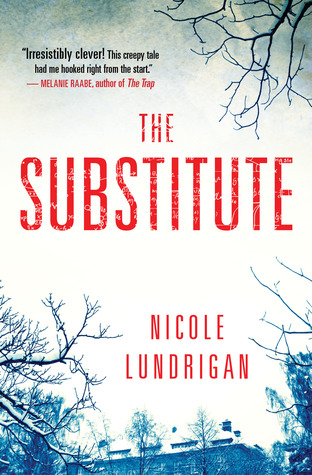Maybe I did love Evie. In the same way I had loved Button. But also, in a different way. One was not a substitute for the other. My love for Evie was arresting and wistful and furious and benevolent. A swirling storm that had claimed me. There was nothing I would not do to protect her. Protect her blinded heart.The Substitute is, as promised by cover blurbs, “creepy” and “clever”. Author Nicole Lundrigan maintains just the right mix of confusion and confession – nothing seems like what it is, but you can't catch her in a trick – and with so many interesting (not to mention disturbing) events occurring throughout, I found this to be an engaging read. I wouldn't call it capital-L “Literature”, but a decent story, and just what I was in the mood for.
The novel is told in two rotating points-of-view: First person from that of a sociopathic, unnamed narrator (quoted above), and from an omniscient third person, following a man with a different definition of “substitute”:
He reminded himself that his childhood days were far behind him. He was a grown up now, a man, a developmental biologist, a PhD. In the future, a tenured professor, if that was what he decided to do. Right now he was taking a slight sidestep, a year-long break from his lab to become a substitute teacher in middle school.This substitute teacher, Dr (but prefers “Mr”) Botts, is a fragile man – haunted by childhood trauma and soothed by OCD-like counting and routines – so when one of his students is found having hanged herself in his back yard – using a system of pulleys from his unit test; the test stuffed into her dead mouth – he is not only overwhelmed, but incapable of explaining himself to the local police. If anything, Botts feels too much:
Too many pictures inside his brain. Too much pressure. His skull wanting to explode. When he was a boy, he would have described them all to his father. Image by image, he would tell his father what troubled him. What was building inside his mind. It was so easy then, flicking them away, cards from a scary deck. His father always took them, and said, “Just count something, War. Just count.” Warren had felt soothed, but that sensation of comfort, of security, did not last. His father was unable to hold those cards, to keep them pressed to his chest, and in the end, he gave every single one back.By contrast, the unnamed narrator feels so little (I have been informed that the author believes revealing even the gender of this narrator is a spoiler, so I will used the pronoun "X"): X hurts and manipulates others, orchestrates truly horrifying events and watches it all play out with stony detachment. So it was galvanic when an event did affect X:
Something ripped open inside my head, a thousand hands reaching up and yanking. Threads of me were screaming, but I stood, motionless, expressionless, only blinking, blinking, while a putrid cavity formed. I could not see. I could not see. I think I might have been shaking. Revulsion and disgust seeped out into my chest cavity, and I could not take a breath.The Substitute is a Mystery/Thriller/Psychodrama, so I'm trying to be careful and not give anything away (the girl's death happens immediately [and is outlined on the cover] so I don't consider it a spoiler). But I do want to note that, as much as the dual protagonists might seem like opposites, they have much in common – and not just cold mothers, absent fathers, and sisters in need of protection; they're both injured and finding ways to deal with a soul-hurting world. Something about this subtext elevates the book in my mind, and while I might properly consider this a 3.5 star read, I'm happy to bump it up.
This review is shorter than usual (trying not to spoil anything), so here's an excerpt with a favourite early scene:
His hands were folded together across his chest. Nails trimmed, four fingers resting across four fingers. When I stood near the box, I reached out, touched his cool skin. I could almost detect a hint of warmth still lingering there, and I entertained the thought he would wake up once weighted under the soil.
Glancing behind me, I noticed funeral-goers were granting me some time alone. A tender moment to say goodbye. I ran my hand over his, then grabbed his middle finger, his "swearing finger", as I had heard kids at school say, and I squeezed it. "Oh Dad," I whispered. "Where are you now?" With another quick look over my shoulder, I cranked his finger backward, pressed down, felt dead ligaments tearing, a distinct and pleasant pop.
When I stepped aside, his finger remained displaced. My mother waddled up for a subsequent pass, and noticed. Cheeks flushing the same unnatural colour as her husband's, she tried to reposition it, tried to slip it under his index finger. Tried to bend it the other way. No luck. It rose up again, telling the world what he thought of them. I noticed other mourners smirking, nodding. I hope the bastard stayed like that forever.
Curiously, when I read that to Dave, his only comment was on the use of "bastard". Odd, that.

